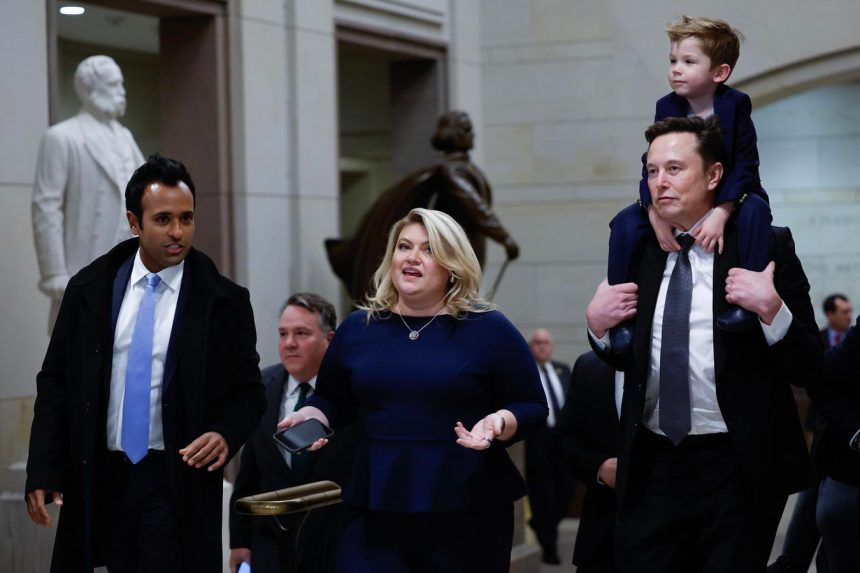The nascent Trump administration, buoyed by a perceived pro-cryptocurrency stance and the establishment of the Department of Government Efficiency, has ignited a spark of optimism among Americans hoping for a significant reduction in the federal government’s footprint. Achieving this laudable goal, however, will be a Herculean task, demanding a concerted effort to dismantle a deeply entrenched bureaucracy that has woven itself into the fabric of American life. Beyond the well-documented spending excesses, the federal government’s ever-expanding reach has consistently erected barriers to individual prosperity, contributing to a ballooning national debt poised for explosive growth in the coming decades. This legacy of the administrative state, characterized by overspending, overregulation, and an unwieldy structure, presents a multitude of opportunities for streamlining and reform, as detailed in a comprehensive report by the Cato Institute.
Despite a growing awareness of the need for government retrenchment, many policymakers remain hesitant to loosen the reins on financial markets, clinging to the notion that this sector requires special intervention to safeguard individuals from risk. This prevailing wisdom, however, is fundamentally flawed. As argued by Cato scholars, including the authors of a new policy guide for the 119th Congress, financial regulation can be effectively achieved through a lighter touch, primarily focused on combating fraud rather than restricting individual financial choices deemed “too risky” by regulators. This approach emphasizes personal responsibility and acknowledges the inevitability of occasional financial missteps, promoting a system grounded in realistic expectations and individual judgment, rather than relying on the fallible foresight of regulators.
The current regulatory paradigm, predicated on the belief that bureaucratic mandates can guarantee positive financial outcomes, has demonstrably failed. Regulators, being human, are prone to errors in judgment, and their attempts to control complex financial systems have not eradicated losses or crises. Instead, this approach has merely shifted the burden of trust from market participants to regulators, resulting in a labyrinthine regulatory framework that disproportionately benefits the well-connected while hindering the financial autonomy of ordinary Americans. This system provides a false sense of security, leaving individuals vulnerable to the very crises it purports to prevent.
For President Trump to achieve meaningful and lasting change, close collaboration with Congress is essential. While the first Trump administration made some headway in curbing regulatory growth, many of these changes were implemented administratively, making them easily reversible by subsequent administrations. The 119th Congress, armed with the insights provided by the Cato policy guide and other reports, has a unique opportunity to dismantle the administrative state and restore greater freedom and efficiency to the American economy. This collaborative effort is crucial for establishing permanent reforms that cannot be easily undone by future administrations.
The housing finance sector, in particular, presents a fertile ground for reform. Congress could begin by refocusing Fannie Mae and Freddie Mac on financing primary residences and limiting the Federal Housing Administration’s single-family insurance portfolio to first-time homebuyers. Furthermore, revoking Fannie and Freddie’s exemption from securities registration requirements would level the playing field with other public companies and address the implicit government backing that distorts the market. Another critical area for reform is financial privacy. Decades of expansion under the Bank Secrecy Act have eroded financial privacy, leaving Americans’ financial records vulnerable to government scrutiny without the Constitutional protections afforded to other forms of property. Amending the BSA to require warrants for access to financial records would restore a crucial safeguard against unwarranted government intrusion.
Beyond these core reforms, numerous targeted regulatory changes could significantly improve the functioning of both capital markets and the banking sector. For instance, Congress could open private offerings to all investors, regardless of wealth, create a de minimis exemption for smaller offerings, and streamline disclosure requirements for initial public offerings. Similarly, the banking sector could benefit from consolidating regulatory oversight, potentially by designating the Office of the Comptroller of the Currency as the primary regulator for larger banks and the Federal Reserve district banks for smaller institutions. Further streamlining could involve removing the Consumer Financial Protection Bureau’s examination authority, transforming the Federal Deposit Insurance Corporation into a non-regulating resolution agency, and eliminating the Fed’s Vice Chair of Supervision. These reforms, along with countless others proposed by policy experts, would address the detrimental effects of excessive government intervention in financial markets, enabling companies to better serve their customers and, ultimately, benefit society as a whole. The hope is that the renewed Trump administration and the 119th Congress will recognize the urgency of these reforms and work together to steer America toward a more prosperous and free future.



